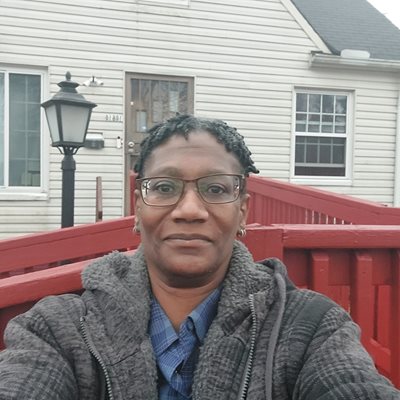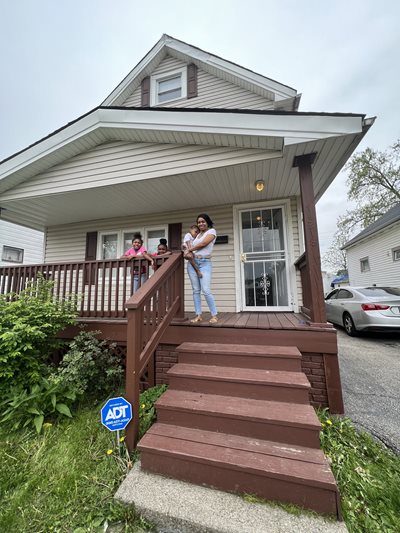Catrina Hardy's street in Ohio is quiet. Her three-bedroom home is not far from work, with a one-car garage and backyard that she says is, "Not too big, not too small." It's just right. She no longer hears someone else's music coming through her walls.
As she describes it, when she moved in last year, "It was a dream come true." She was so ready to get settled into her new home that it only took her two days to unpack and find the perfect place for all of her belongings.

Like many long-term renters, Hardy thought: I'll never own a home. One reason she shares, "I'm a recovering addict." And while staying sober and having a steady job helped her self-confidence, it didn't completely alleviate Hardy's feelings of uncertainty. "I spent a lot of time being caught up in my fears and doubts when it came to owning a home."
That's one reason why NeighborWorks network organizations like CHN Housing Partners work to offer a range of services, including homeownership education and financial coaching. And that's what ultimately helped Hardy's fears and doubts fade and make way for her dream: Owning a home.
Hardy learned about CHN through the organization's utility assistance program, so she was already familiar with the local nonprofit when a coworker told her about Believe Mortgage, run through CHN Housing Capital. She went online to learn more and started attending classes.
"I had to understand the responsibility and the accountability," she says. Private meetings with her housing counselor "helped in crossing all my t's and dotting all my i's" so she could get preapproved for a loan. One of the steps she needed to take was paying off two smaller loans. With preapproval in hand, Hardy worked with a real estate agent and identified homes that would be best suited for her income.
Building a mortgage program to believe in
CHN was founded in 1981 to improve housing stability and opportunities for homeownership. One of the organization's early programs was a lease-purchase option which, during the housing crisis of 2008, stopped working for residents as banks turned the other way. "One day, 95% of the people we were working with were bank-eligible borrowers," says Kevin Nowak, president and CEO of CHN. "The next day, they weren't – they couldn't get access to that capital. We wanted to do all we could to help."
CHN began lending to its residents to fill the need, which was the beginning of what later became
 Danelle Moore also used Believe Mortgage to buy a home for her family.
CHN Housing Capital, a lending arm and certified community development financial institution (CDFI). CHN hoped that, when the recession ended, access to credit would go back to something near normalcy. That didn't happen. As always, he says, people of color were impacted the most. "There now are greater disparities in homeownership between white communities and Black communities than there have been since the 1960s."
Danelle Moore also used Believe Mortgage to buy a home for her family.
CHN Housing Capital, a lending arm and certified community development financial institution (CDFI). CHN hoped that, when the recession ended, access to credit would go back to something near normalcy. That didn't happen. As always, he says, people of color were impacted the most. "There now are greater disparities in homeownership between white communities and Black communities than there have been since the 1960s."

The organization analyzed the barriers to homeownership, looking at credit scores and downpayments, at accessibility to real estate agents and appraisals. In 2021, CHN introduced Believe Mortgage, built to knock down those barriers.
The credit score minimum for these loans is 570 – lower than a traditional bank would usually require. Down payment is 3% with no Private Mortgage Insurance. And the organization works with real estate agents who are a part of the Realtist Association, charged with making sure communities of color are treated with dignity and respect. CHN also worked with an appraisal management firm to solve for appraisal bias.
While the mortgage product is for everyone, of the 100-plus loan originations over the past few years, 93% of the clients are Black and 3% are Latino; 47% have been single mothers; 88% have been low income. "We're meeting the need that we said we would," Nowak says. "Next year it will be even bigger. Now it's about us taking it to a greater scale."
The mortgage isn't just a specialty product, he says. "It's about creating accessibility to homeownership, particularly for those who have been left out but for everyone who was looking for it." He believes serving a broader market will help ensure future success.
Success is broken down into three categories.
• There's the product – Believe and other programs.
• There's education, which is not just about homebuyer education, but about showing people that homeownership is possible.
• There's inventory, which includes home repair and rehab to help create new affordable inventory.
"What we've found over the past three years is that two things have been issues for people. It's the credit piece. But it's also been 'Should I be a homeowner?'"
NeighborWorks America's recent consumer survey on housing affordability found that three in five long-term renters say homeownership doesn't feel possible for them, including 41% who say it doesn't feel possible at all.
"For us, there's a whole other education piece around people understanding homeownership," Nowak says. "It's changing it from 'Maybe I shouldn't be a homeowner' to 'I should" and changing 'I can't' to 'I can.'"
NeighborWorks America's recent consumer survey on housing affordability found that three in five long-term renters say homeownership doesn't feel possible for them, including 41% who say it doesn't feel possible at all.
"For us, there's a whole other education piece around people understanding homeownership," Nowak says. "It's changing it from 'Maybe I shouldn't be a homeowner' to 'I should" and changing 'I can't' to 'I can.'"
This also means repairing homes while people are already in them, making a safer place for them to live – and for the next people to live in those homes, too. The mortgage program is doing what they hoped it would do for their residents, Nowak says, echoing Hardy. "It's getting them from where they are to where they want to be."
NeighborWorks America's Black Wealth and Asset Building Group is looking to uplift and support programs like this across the NeighborWorks network. Members of the group, which include representatives from the network and NeighborWorks staff, have created a comprehensive approach to increasing wealth in Black families and communities, says Donna Wright, one of the group's founders. And they're identifying strategies, programs and products, like this one, that can be replicated.
"The statistics have been the statistics for far too long. It's time to do something," Wright says. "So we decided to come together and do just that." At the NeighborWorks Training Institute next week, the Black Wealth and Asset Building Group is presenting two learning labs where network members from California and Washington will be sharing replicable strategies and programs that focus on building wealth in Black families and communities. The group is planning to offer these learning labs at every NeighborWorks Training Institute, both in person and virtual.

